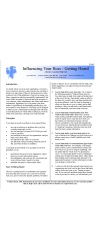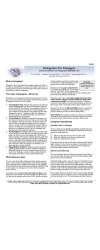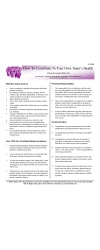The following question is about a workplace, but the things that make teams function well apply to ANY kind of group or team, whether it’s a sports team, non-profit action group, or in the home (yes, your family is a team too).
Question
Our branch has been moving towards a more participatory management approach, where staff have been invited to be more involved in decision-making and discussion. We have a lot more meetings than we used to, and we would like to develop a set of groundrules or guidelines to get people on the “same wavelength” regarding the meetings. We know that whatever guidelines we use must come from us, but don’t want to reinvent the wheel. Can you suggest guidelines that we might use as a basis for discussion?
Answer:
It sounds like you are on the right track. Keeping in mind that there must be group ownership of the guidelines you use, I can suggest using the following list as a basis to start off the discussion. While the list is quite lengthy, I am sure that your group can use some or all of them as a beginning.
Teamwork Ground Rules
a We participate as fully and as openly as possible, while honouring the privacy of others.
- We give feedback directly and openly in a timely fashion, and we provide information that is specific and focuses on the task and process and no on personalities.
- We all come to our meetings prepared with information and materials that are required for the meeting.
- When fellow members miss a meeting we share the responsibility for bringing them up to date.
- We focus on our goals.
- We avoid sidetracking, personality conflicts and hidden agendas.
- We acknowledge problems and deal with them.
- Within our group, we have the resources we need to solve any problem that arises. This means that we all contribute.
- We respect different ideas. We are supportive and not judgmental.
- We are each responsible for what we get from this team experience.
- We ask for what we need from our facilitator and the other group members.
- We encourage others to share ideas in small and large group sessions.
- The feelings of all participants are important.
- We focus on what the team will gain, the strengths we have, rather than what individuals fear they will lose.
- We respect that everyone brings something of value, talent, skill, resources, understanding, etc., for a more effective, efficient organization.
- We operate all meetings with an agenda.
- Everyone is expected to facilitate the meeting and keep it on track.
- Job titles are left at the door.
- We address the process not the individual.
- We communicate effectively. One person talks at a time and all others listen with the commitment to understand the speaker’s message.
- We rotate responsibilities.
- All action items are clearly defined, assigned and scheduled to a specific owner to complete and report back to the group.
- We do not accept the first idea, we go for the second and even a third before making a decision.
- We build each other up and encourage one another.
- We summarize the meeting and get agreement on the action items and owners.
- We set the agenda for the next meeting before breaking up.
- We have fun.
- We are open to new ideas, change and the unknown; that’s the definition of an adventure.
- We show willingness and comfort in making decisions and acting.
- We act to benefit the whole company.
- We are all involved in cross-functional work.
- We show willingness to pitch in and help.
- We take problems directly to the right person for decisions and action.
- We coach, support and encourage other employees in making effective decisions and taking actions.
- We seek and share new information.
- We create an environment to actively learn from each other.
- We are willing to admit failures. We have the courage to review them and the maturity to learn from them.
- We transfer learning into effective action for our customers.
Thank you to J.C. Petkevicius of Cybernetix Inc., for making this list available.
Code: mxyzpickle






